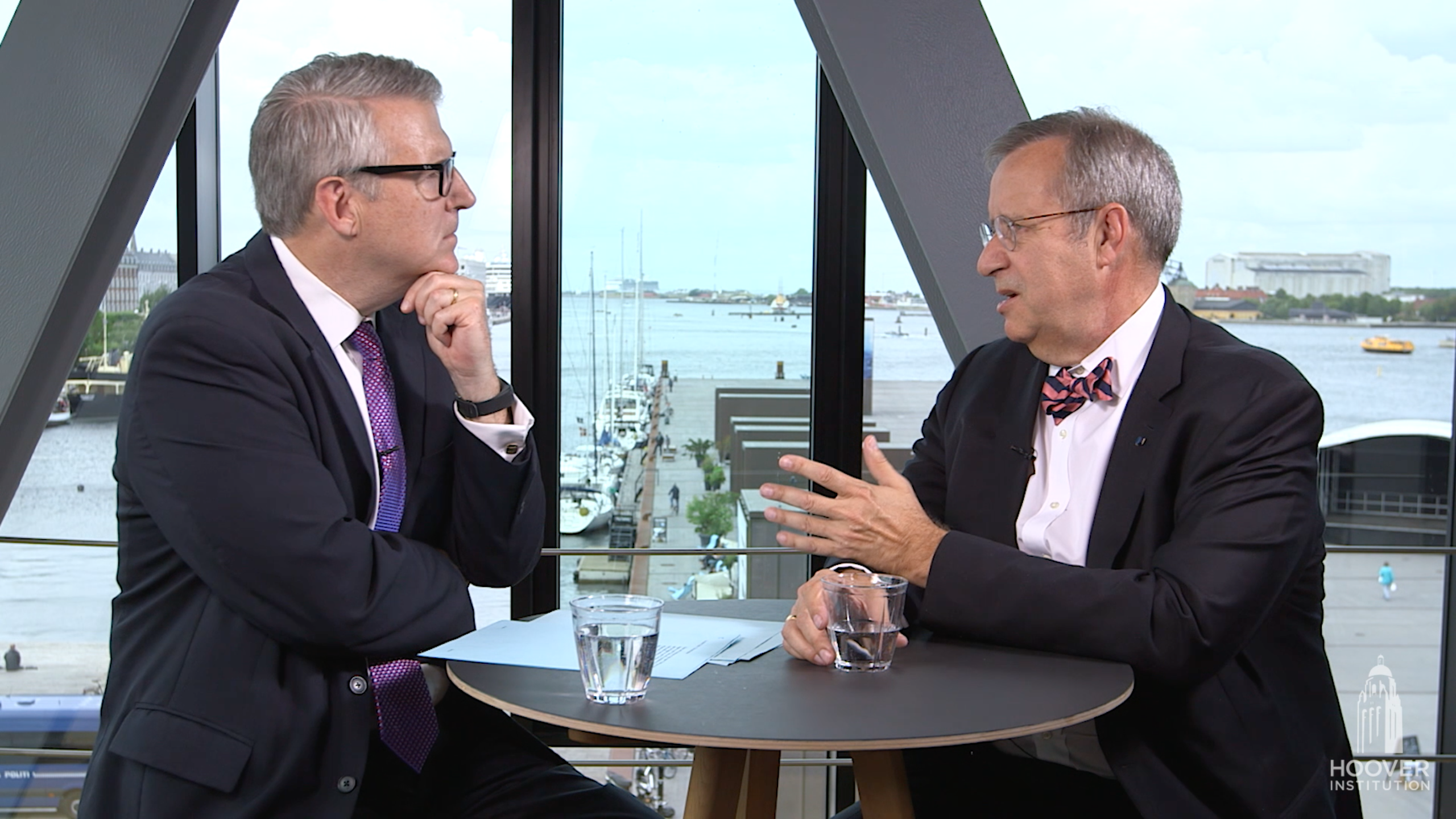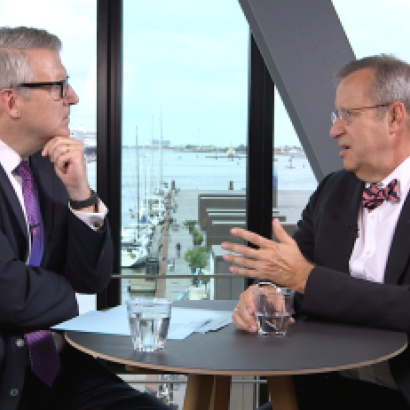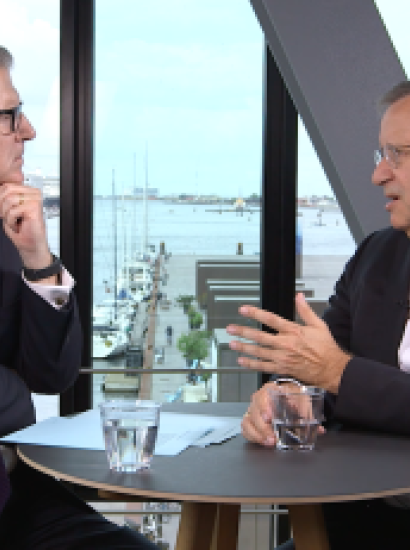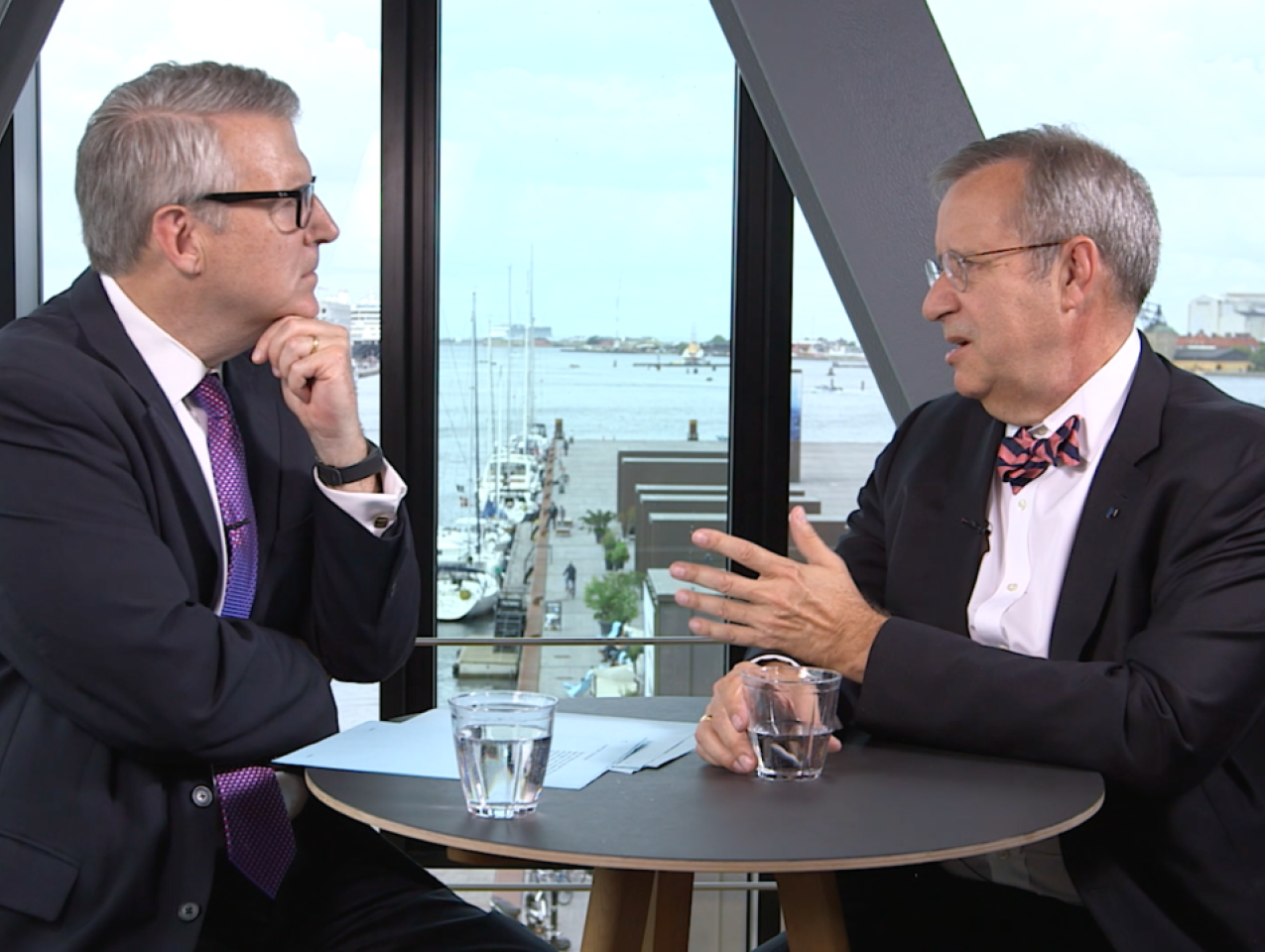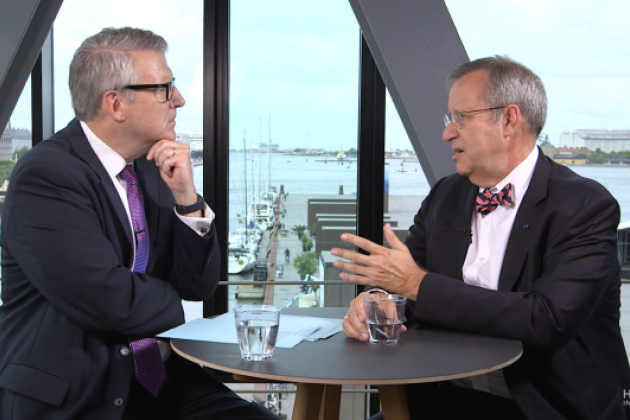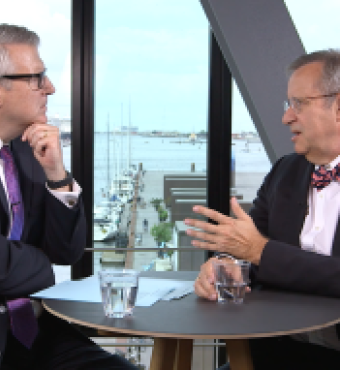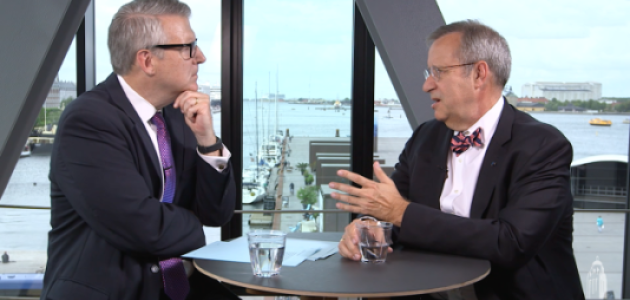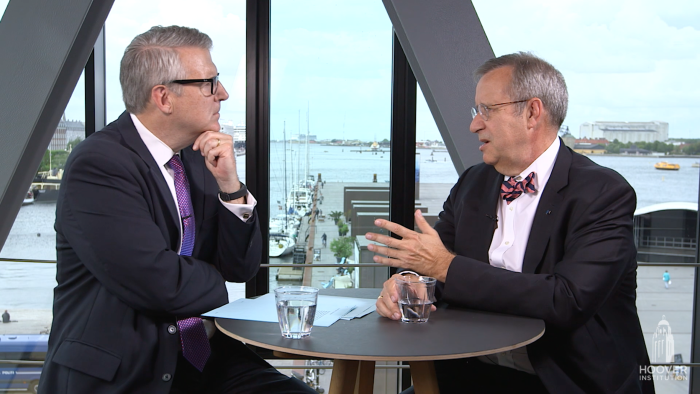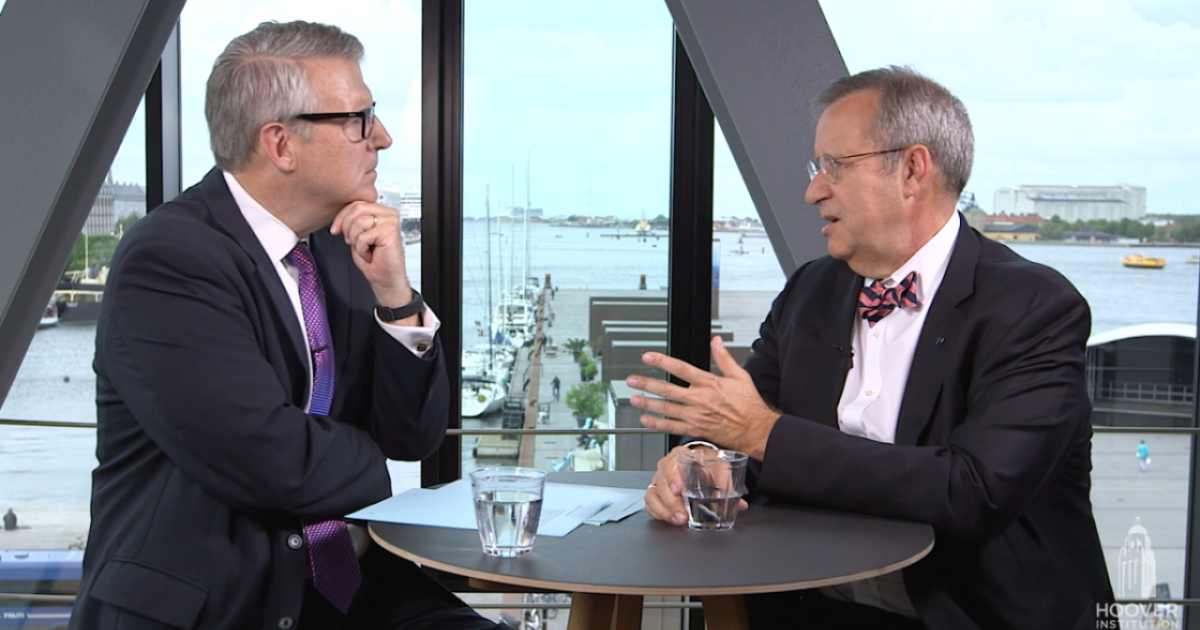Recorded on June 22nd, 2018.
In a special edition of Uncommon Knowledge at the Copenhagen Democracy Summit, Peter Robinson interviews former presidents and prime ministers on one subject: democracy. Following a unique format, Robinson asks each of the guests the same questions to get their distinctive perspectives on issues such as the rise of authoritarianism in Russia, communist China, and the prospects for democracy.
The guests include the former deputy prime minister of the United Kingdom, Nick Clegg; former president of Mexico, Felipe Calderón; former president of Estonia and current Hoover visiting fellow, Toomas Hendrik Ilves; and former prime minister of Denmark, Anders Fogh Rasmussen.
The guests analyze economic growth in China and how that growth did not lead to the democratic country predicted by economic experts in 90s. They dive into why China does not truly have a free market, nor does it follow traditional Leninist/Marxist communism’s disdain for material goods. The guests go on to analyze changes in Russia in the last thirty years under President Putin and how foreign policy with Russia has affected their respective countries. They discuss the future of Russian and Chinese relations and how they believe those two countries are trying to shape the world.
About the Guests:
Nick Clegg was the deputy prime minister of the United Kingdom from 2010 to 2015.
Felipe Calderón was the president of Mexico from 2006 to 2012.
Toomas Hendrik Ilves was the president of Estonia from 2006 to 2016. He is currently a Hoover visiting fellow.
Anders Fogh Rasmussen was the Prime Minister of Denmark from 2001 to 2009. He was the Secretary General of NATO from 2009 to 2014.
Additional Resources:
- Uncommon Knowledge in Copenhagen: Revitalizing Democracies Around the World
- The Copenhagen Democracy Summit
- America’s Will to Lead With Anders Fogh Rasmussen
Peter Robinson: Presidents and Prime Ministers all talking about one subject, democracy. From the Copenhagen Democracy Summit, Uncommon Knowledge now.
Peter Robinson: Welcome to Uncommon Knowledge, I'm Peter Robinson. Today we are in Denmark for the Copenhagen Democracy Summit. Russia resurgent and authoritarian, China rising, and communist. What are the prospects for democracy? Whereas we usually one of two guests a number of questions, today we're going to ask a number of guests just a few questions.
Peter Robinson: What do our guests have in common? Each has dedicated much of his life to the workings and ideals of democracy. With us today, former Deputy Prime Minister of the United Kingdom, Nick Clegg. Former President of Mexico, Felipe Calderón. Former President of Estonia, Toomas Ilves. And the former Prime Minster of Denmark, and former Secretary General or NATO, Anders Fogh Rasmussen.
Peter Robinson: Here's a quotation from a former colleague of mine, the late economist and foreign analyst Harry Rowan, writing in 1996. "When will China become a democracy? The answer is around 2015. That prediction is based on China's steady and impressive economic growth, which in turn fits the pattern of the way in which freedom has grown in Asia and elsewhere in the world."
Peter Robinson: South Korea, economic growth leads to democracy. Taiwan, economic growth leads to democracy. And in China, instead of democracy, we have President Xi , term limits removed, China effectively has a new emperor. What went wrong?
Felipe Calderón: I think it's not exactly that free trade will bring you to democracy. That a proof. And I think it's a question of principles, it's a question of international pressure, maybe, but that we all maybe made a mistake related with China, in that aspect.
Nick Clegg: Yeah, look, I mean with hindsight, as ever, things are so much easier to see with hindsight. The assumption that there is an umbilical link between the profit motive and voting is actually, with hindsight now, a rather naïve assumption. But look, I think we've learned the hard way. This assumption, particularly after 1989 and the collapse of the Berlin Wall, that liberal democracy was going to be triumphant. Everywhere that a sort of mixed capitalist economy would always dance to the sunset hand in hand with mature ... You know, these things have been proven wrong.
Felipe Calderón: And actually, it's not exactly a free market China. Because there's not exactly free trade. One of the principles of a market is if you made a mistake in your business-
Peter Robinson: You get to fail.
Felipe Calderón: Yeah, you go to bankruptcy. And that is not happening in China. Because always the state of the government is able to recover, and to protect, and to rescue any company they decide. Which is ... they are breaking one of the main principles of market, of free market. You need to fail. There's not exactly such a market.
Peter Robinson: Right. Right, right.
Peter Robinson: Anders, the thinking was that even as South Korea became wealthy, and then a democracy, and then Taiwan wealthy and then a democracy, China, as it grew more prosperous would move in a democratic direction. That has not happened. What went wrong?
Anders Rasmussen: Actually, I don't think it went wrong. I'm still hoping.
Peter Robinson: Are you are?
Anders Rasmussen: Yeah, I am. That developing an economically strong middle class in China will eventually also lead to democracy because they will request to have a say.
Peter Robinson: So, 10 years, 50 years, you're playing the came for centuries.
Anders Rasmussen: Yeah, but let's say 10 years. If we meet in 10 years time, I think you and I could agree that something positive has happened also in China.
Peter Robinson: Also in China.
Peter Robinson: How seriously do you take the Chinese as communists?
Toomas Ilves: I've met members of the party who drive Rolls Royces, so it is virtually nothing to do with Marxism and Leninism. It's not ideological in the sense of sort of left, right ownership, who owns the means of production and all that. I think it's rather a ... it's a new form of a Mandarin class.
Peter Robinson: Russia. The end of the Cold War, Russia makes an attempt at becoming a good faith democracy, it's flawed under Yeltsin, but it's a real democracy. And now nobody would call Russia a democracy. What went wrong in Russia?
Anders Rasmussen: Well, when I first met President Putin in 2002, he was very strong pro-Western politician.
Peter Robinson: In 2002?
Anders Rasmussen: In 2002, that was actually immediately after 9/11. He was the very first president to call President Bush and to ... he suggested that I could cooperate, and if you go back and see the first public statements from the newly elected President Putin in 2000, 2001, you will see many statements where he indicated in interest in joining NATO. Then suddenly he turned anti-Western. And I think that's because of two things. Firstly, the so called Rose Revolution in Georgia that brought Saakashvili to power.
Peter Robinson: Georgia, yes.
Anders Rasmussen: In Georgia. And the so called Orange Revolution in Ukraine that brought Yuschenko to power. Both those colored revolutions convinced Putin that the Americans in general, and CIA in particular, aimed at exporting those color revolutions to the Kremlin and get rid of him. And from 2005, he turned anti-Western. That went wrong.
Peter Robinson: Got it. He convinced himself that first Georgia becomes democratic, then Ukraine becomes democratic, and then he's next.
Anders Rasmussen: Yes.
Peter Robinson: His regime is next.
Anders Rasmussen: And in 2005, he issued the public statement that the biggest geopolitical catastrophe of the last century was the collapse of the Soviet Union.
Peter Robinson: What went wrong in Russia?
Toomas Ilves: I think you can also generalize this to other countries, but I think the original sin was voucher privatization. In that every country had to privatize. But, Russia and Ukraine, and a number of other countries actually did voucher privatization for everything. Whereas in my country we only did it for living space. So I mean, if you lived in an apartment-
Peter Robinson: But explain voucher privatization.
Toomas Ilves: Well, because you work, in say, a nickel plant, the valuation of a nickel plant is ... 500 million dollars, and then you divide that money by the number of workers, and each one gets a voucher saying, "Okay, you own $10,000.00 in stock for this company." And that's what they did.
Toomas Ilves: The problem with that is that as soon you do that, I mean, immediately the value of the stock plummets, and within a matter of weeks or months, what was nominally worth $10,000.00 is worth 10 cents, or a bottle of vodka, or something. And then those people who had ... who in the beginning of 1990s had access to large amounts of cash could just buy this up and legitimately become owners of companies or enterprises worth hundreds of millions, in some cases billions of dollars for peanuts.
Peter Robinson: The foundation of the oligarchy.
Toomas Ilves: Right, that's precisely it. But now the point is if you think about the late 80s, early 1990s, the people who had access to large amounts of cash weren't necessarily the greatest people. They have accumulated vast amounts of money in a system where that really wasn't possible through legitimate means, and so they bought these things up. And so then you-
Peter Robinson: So these are masters of the black market?
Toomas Ilves: Yeah.
Peter Robinson: They're insiders, friends of Yeltsin? They're close to the intelligence operations ... who are they? Who are they?
Toomas Ilves: I would say mainly intelligence and black market deals.
Peter Robinson: Okay.
Toomas Ilves: And so people who are already-
Peter Robinson: These are not Eagle Scouts.
Toomas Ilves: Yeah, of dubious ethics with huge amounts of cash by Russian standards, then with that, money buy things that are 100 times worth more. It's probably the ... it was like the bargain basement sale of the century in the world.
Peter Robinson: From the National Defense Strategy, which is a document released earlier this year by the American Secretary of Defense James Mattis, "It is increasingly clear that China and Russia want to shape a world, not their regions, but a world consistent with their authoritarian model." Close quote. So 30 years after the Cold War ended, the democracies find themselves in a new permanent struggle with authoritarian states. Is that an accurate description, or is that the American's being melodramatic?
Anders Rasmussen: Well, it's accurate in one respect. But I think there's difference between Russia and China. Russia is a geopolitical spoiler. It's a declining society. While China is a rising economy. And I think at the end of the day, the Chinese leadership realizes that if they are to survive, they have to continue to be able to generate economic growth. To that end, they need to cooperate with the US, they need a well functioning, open, free trade system in the world, and they need to transfer new technology to China.
Anders Rasmussen: All that will require upholding, more or less, the current world order. So I think that while China and the US in the future will be competitors, of course they will, I think at the end of the day, they will work and walk hand in hand. And that's actually the optimistic message.
Peter Robinson: "It is increasingly clear that" ... clear. Clear, clear, things we can see with our own eyes, "That China and Russia want to shape a world, not just their regions, a world consistent with their authoritarian model." Close quote. Accurate? Or is this the American's being melodramatic? This is essentially saying we're in a new Cold War. We're in a new long existential struggle.
Nick Clegg: Clearly there is a huge clash now between the broadly speaking small L, small D liberal democrat value, democratic values that you have in Europe and North America, with this sort of highly centralized, highly authoritarian, and certainly in Russia's case, deeply sort of corrupt. It's in fact a sort of kleptocratic state. That's a clash, that's a clash of values. The great problem we have on several fronts is that I'm not sure if America and Europe now see the world in the same way. Particularly with Donald Trump in office. So the American worldview sees China as the biggest strategic challenger to American hegemony. If you're in Europe, much closer geographically to Russia, and you see Putin messing about in your backyard, you feel that is a much greater threat to our continent than it is to the US.
Nick Clegg: So oddly enough, if it is possible to agree that Russia and China, in their different ways, are posing disruptive challenges to the kind of values we both share, oddly enough, I actually think at this moment, unfortunately, Europe and America are seeing the world, and seeing those challenges, more differently than they have done at almost any times in the post war period.
Felipe Calderón: The first thing I ... it is not clear, it is not evident that that is happening, but it's possible. Second, China ... I'm not an expert on that, but I believe China and Russia have different strategies regarding that. My opinion, in the case of China, I believe they don't want to change the way they are, they want to be accepted the way we are and the way they are-
Peter Robinson: They want to be a great power.
Felipe Calderón: Yeah. Yeah, but they don't want to change anyone else. And my perception is the Russian's foreign policy is more active, more aggressive, if I can say that.
Nick Clegg: But also Felipe, perhaps less strategic, don't you think? In the sense that I get-
Felipe Calderón: It's a different strategy.
Nick Clegg: Yeah. But I get the impression ... I don't know, I get the impression that for Putin, and you can see it from his point of view, he just wants to kind of mess stuff up as much as possible so that we can-
Peter Robinson: Let me ask you this. So Russia, here we have Russia, about 130 million people. The population's shrinking. The Russian population of Russia is shrinking, ethnically Russian population is shrinking. All they have is an economy that is extractive, they can sell oil, and they can sell natural gas, and they can sell minerals, and the price of their main commodities has been under pressure for a decade now.
Peter Robinson: Why are we worried about this backward country that's falling apart? And what does Putin-
Felipe Calderón: It's not falling apart.
Peter Robinson: So what does Putin want?
Felipe Calderón: He wants to be the successor of Peter the Grand [Great], definitely, no? It's not exactly ... I think he wants to be-
Peter Robinson: He really-
Felipe Calderón: He doesn't want to be rebuild the Soviet Union-
Peter Robinson: He wants respect, or more?
Felipe Calderón: He wants to be the tsar of this century. And he is in the role to do that. But he wants to be a dominant country, a dominant tsar in the modern world. And instead of I believe China wants to get the leadership of the world, and they are getting a more economic strategy supporting other countries, investing-
Nick Clegg: I think in Russian history, there's this long, long, long ambivalence about is it a western facing country-
Peter Robinson: Yes, yes.
Nick Clegg: Or eastern facing, and it's a vast country which stretches east and west, it is a nuclear armed country, it's got a vast military apparatus. But it's one that has always been concerned about encroachment. And I mean encroachment from its strategic, or what it has perceived to be its strategic rivals, either in America or in Europe. And you know, I don't always repeat the history about the perception that sort of NATO is expanding too far, it's right onto the borders of Russia, and then this wish, this very, very deep seated Russian wish to sort of keep the west at arm's length, and have these sort of buffer countries. I mean, all of that is playing itself out all over again.
Nick Clegg: My point was, I think the way that Putin is going about achieving those aims is through this almost relatively common, almost anarchic hybrid form of activism and disruption. It's elevating disruption-
Felipe Calderón: Yeah, I agree with that.
Nick Clegg: To a kind of strategic tool.
Felipe Calderón: It's more aggressive. More negative to say, no?
Nick Clegg: And that's where I think the Chinese, in a sense, that sense, take a more conventional approach, that exercising big power authority, and they're doing it logically, not least in their own neck of the woods, and that's why you've got this pinch points in the South Pacific.
Felipe Calderón: But if the Chinese are not looking to conflict by themselves, no? There is not a equivalent to Kremlin in the Chinese free policy.
Peter Robinson: But in the South China Sea they've taken those little atolls.
Felipe Calderón: Well, but it's a more sophisticated way to do that, instead of just invading.
Peter Robinson: "It is increasingly clear that China and Russia want to shape a world consistent with their authoritarian model." Close quote. Is that accurate? An over construction? Do the democracies now find themselves in a permanent struggle with China and Russia that in some ways parallels the Cold War we all lived through?
Toomas Ilves: Well I think that ... I think Russia is largely an appendage to that. They don't really ... I mean, they have delusions of grandeur and restoration, but I mean, the real player is China. And in the case of China, you do have basically a sort of philosophical clash of governance. It's not ideological. I mean, China's a very capitalist country. But it's a matter of how you rule and what is the role of the citizen in the society.
Toomas Ilves: China is much more driven by this ... I mean, in some ways similar to Russia, but this feeling that they have been denied what's theirs, they're sort of ... from the 1840s on they were the great power, the oldest civilization, and then this century and a half of humiliation that then basically Deng Xiaoping brought them out of though, in fact, I think it was the motivation behind much of what Mao Zedong did, but it kind of went off in the wrong direction.
Peter Robinson: The role of Europe. As Prime Minister, you were very pro European union, now we find a circumstance in which two years ago the British voted to leave the European Union altogether. The Italians just had an election in which Euro-skeptical parties, I don't know that anybody's calling for a referendum yet to withdraw from the EU, but Euro-skeptical parties are now in government in Italy, Austria is skeptical of the EU, the new president of Austria. The alternative for Germany, the upstart Euro-skeptic party in Germany now is giving Chancellor Merkel difficulty. The European Union needs to be defended. If there is a defense for it. What is your view on the EU? Good for Denmark, and good for the world still?
Anders Rasmussen: Yeah, well, we need the EU as a small country we are very much dependent on cooperation with other nations. But the EU has to reform itself, and I would mention two issues. Firstly, the EU most strengthen its external border control. If you do not trust the external border control, then you will protect yourself raising internal borders, and that will hamper free movement. So I think we should hand over to the European Union to control the external border. It's not for Greece, Italy, Spain, it's for the EU to do that. So that's one thing.
Anders Rasmussen: Secondly, we should reform our welfare system. We should tell people, "You have free access to our labor market, but you don't have free access to our welfare system. You have to work and contribute to our society, in five or seven years, before you can get full access to our welfare system." That's a way Europe can invite the immigrants we do need without ... I mean, without people fearing that they will lose their culture and their identity.
Peter Robinson: So on immigration. I'm thinking through this question now as I formulate it, so bear with me a little bit. But what was it, two years ago, 2015 Angela Merkel lets in more than a million to Germany from Syria, chiefly from Syria as I recall, and causes, as far as I can tell, the political ramifications of that have yet to settle down in Germany. The long term question is as follows. The European birthrate is below replacement level.
Anders Rasmussen: [inaudible 00:21:01]
Peter Robinson: Right? And in Africa, what's the population of Africa, 1.2 billion now?
Anders Rasmussen: Yeah.
Peter Robinson: Of those 1.2 billion, at least 600 million would look at Copenhagen and say, "I'll take that."
Anders Rasmussen: Of course.
Peter Robinson: So the long term pressures of migration northward from Africa will be enormous.
Anders Rasmussen: Yeah.
Peter Robinson: You trust the EU to handle that?
Anders Rasmussen: Yeah, but that's-
Peter Robinson: You can persuade your fellow citizens to trust the EU to handle that?
Anders Rasmussen: Not without reforms, and that's exactly why I say, "Okay, we need immigrants." Because Europe has an aging population.
Peter Robinson: Yes, yes.
Anders Rasmussen: So we need people who will work. So let's invite them, but you cannot get access to our welfare system until you have contributed to our societies for five or seven years. I think that's a way the US, Canada, Australia, other migration ... or immigrant countries, they handle it. It's a way to ensure that people are well ... or will become well integrated in our societies.
Anders Rasmussen: And we should recall that the problems today are related to what I would call culture and identity. It's not social or economic problem, but people are afraid that their culture, their religion, their way of life are threatened by immigrants. So the only way to solve that problem is to make sure that immigrants are well integrated.
Peter Robinson: I see.
Peter Robinson: The argument is that a lot of Europeans look at the European Union and say, "This thing is a solvent of nationhood, it undermines national sovereignty." How do you look at it from the Estonian point of view? How did you look at it-
Toomas Ilves: Well, I was foreign minister at the time when he made the decision to do that. And-
Peter Robinson: So you were in the middle of it.
Toomas Ilves: Yeah, I was the one that said we have to go to the European Union. And it was very ... I mean, sort of rational pragmatic reason. The Russophile tendencies in a number of NATO members at the time would have precluded membership for us if it applied to NATO, and they would have vetoed. But ... and all it requires is one veto, so I mean-
Peter Robinson: Wait, you're talking about NATO now?
Toomas Ilves: NATO, I'm talking about NATO.
Peter Robinson: Okay, okay, okay.
Toomas Ilves: But I'm getting to the EU.
Peter Robinson: All right, got it.
Toomas Ilves: But if you're in the European Union, you can't veto another EU member states membership, a membership in another organization. So that was the idea. Is that we join the European Union, Germany, they can no longer say, [inaudible 00:23:40].
Peter Robinson: So you joined the EU as a way of making sure of your membership in NATO?
Toomas Ilves: Well, [inaudible 00:23:45], yes, but that was one of the reasons. Of course-
Peter Robinson: That's not a very aspirational reason, Toom.
Toomas Ilves: Well, I actually did want-
Peter Robinson: I'm expecting a defense of the EU here.
Toomas Ilves: No, there is ... I mean, I-
Peter Robinson: Okay.
Toomas Ilves: Strongly defend the EU, but I'm saying the motivation was that their ... The real motivation was to do the reforms that were necessary. And this is what I tell aspiring countries to NATO, like Ukraine and ... well, Ukraine and Georgia, I say, "Look, if you're good enough to get in the EU, then you get into NATO, but you better then make yourself good enough to be ... to get into the EU."
Peter Robinson: So it's a way of imposing stringent standards?
Toomas Ilves: Absolutely. And that's ... and we met those. The difference between the other way of looking at it metaphorically is that okay, NATO is you buy yourself a suit of armor and you pay rent of 2% of your salary every year.
Peter Robinson: Right, okay.
Toomas Ilves: In the case of joining the EU, you ... the joining process consists of step by step replacing every bone in your ... osteoporosis infected bones with new titanium bones, that then basically ... I mean, you impose the rule of law that way in societies that had not been used to rule of law for over half a century.
Peter Robinson: Question about the American role then. We're at a conference which was being hosted by former Prime Minister of Denmark, Anders Fogh Rasmussen. Quote, "The world needs a policeman. The only capable, reliable, and desirable candidate for that position is the United States. America is destined to lead." That's one quotation. Second quotation, Irving Kristol, the American political scientist writing while the Cold War was still underway, 1983, and he was very skeptical that NATO ... NATO should be reformed, he thought, as long ago as 1983. "If we've learned anything from the experience of the last 30 years, it is that dependency corrupts to the degree that Europe has been dependent upon the United States. The European will has been corrupted, and European political vitality has diminished." Close quote.
Peter Robinson: So, the American role. Now we'll come to you in a moment, because you live with us as a neighbor. But here's the European. So Donald Trump ... Donald Trump does not present himself as an intellectual, but there's a strain of thought that America's taking such a dominant role in the world, and particularly in the relationship with Europe, has undermined Europe itself.
Nick Clegg: So I think that bit of it is just complete rubbish. This idea ... [inaudible 00:26:41] because there's no evidence at all. The idea that somehow-
Peter Robinson: Whoa, whoa, whoa. Don't you mean there's no evidence at all, you're down to a Navy of what is it, seven ships and not a single carrier? The Germans have six submarines, zero of which is seaworthy now?
Nick Clegg: I'm sorry, the quote you quoted was implying that there's some of political enfeeblement and corruption, which is-
Peter Robinson: Oh, I'm sorry, no, no, no, I don't think-
Nick Clegg: But the extension of the corruption.
Peter Robinson: The word corruption is here, okay. [crosstalk 00:27:01]
Nick Clegg: Of the US security-
Peter Robinson: You're making a different point.
Nick Clegg: Look, in terms of military hardware and resources-
Peter Robinson: Yes.
Nick Clegg: Of course it's unbalanced. Of course if you have a hegemonic military super power like the United States, and because of the settlement after the second World War, and because of the history in Europe, of course American has it in effect-
Peter Robinson: But the argument is-
Nick Clegg: But just me finish the sentence. The idea that that has lead to political enfeeblement, or collapse, or even worse, corruption in Europe, is absolute nonsense. It is a function of the fact that America has for a long time been the only world's military super power. That has definitely meant that European governments have felt they don't have to do as much of the heavy lifting themselves. I think it is perfectly reasonable for every American president, and by the way, I was in government when President Obama used to say privately very, very forcefully and un-diplomatically indeed, he was always much more diplomatic in public, that he wanted, on behalf, totally understandably of American taxpayers, to see European taxpayers foot more of the bill. I think all of that is totally reasonable. And there will be ... you know, should be a bit of rebalancing over a period of time.
Nick Clegg: But that is quite, quite different to what we now have. Which is a US president who is moving way beyond an argument about how you burden share in terms of the cost of the Trans Atlantic military alliance to basically kind of denigrate the very idea of a Trans Atlantic military alliance. And, as I said earlier, departing radically from the principles of multilateralism, from the Bretton Woods Institutions which were basically Anglo-European creations in the second World War, a sharply divergent approach to Russia and China, respectively.
Nick Clegg: So I think ... let's of course constantly berate European governments as we should to spend more money on ... I used to do it when I was in office and say, "Look, Britain spends 2% of it's GDP and Holland should as well, and Germany," fine. But to be honest, that in my view is an important thing to dwell on, but doesn't I think remotely capture the bigger problem, which as we now have in the Trans Atlantic community, the two bits of it, just really seeing the world in evermore different ways.
Peter Robinson: Okay, so-
Felipe Calderón: Well, let me go back to the expression of ... I don't like the expression of world policeman, something like that. I believe in order, which is different. I believe in international order, international law. And I do believe that any order and any law should have one or another enforcement mechanism. And in that sense, yes, the United States is a super power in military terms, but we need to build is ... it's like an international enforcement, international force, like in this movie of Star Wars, no? The force be with you.
Peter Robinson: The force be with you.
Felipe Calderón: And if it's the American Air Force, even better. But that's completely different. No, I believe it's clearly power and is needed to preserve some kind of international order and equilibrium, but don't give the Americans the idea that they can or they must, or they have the right to be the policemen of everyone else. So I don't accept that.
Peter Robinson: Felipe, could I ... again on the relationship with Mexico and the United States, you were one of ... Vicente Fox was the first president elected in Mexico who was from the Partido Accion Nacional, which is broadly speaking center right, correct?
Felipe Calderón: Yeah.
Peter Robinson: And pro market. You were the second president, you succeeded him. During your presidency, incomes in Mexico grew. The economy grew. How much of that, for how much of that ... how helpful was NAFTA in that?
Felipe Calderón: Completely helpful. Honestly, before NAFTA, the Mexican per capita income at PPP was less than $2,000.00, and afterwards reached like $14,000.00 income per capita. And most of that-
Peter Robinson: And that's in 20 years or so.
Felipe Calderón: In 20 years, something like that. So completely successful story for us, definitely. And even for the United States. 1.1 families in the United States depends directly-
Peter Robinson: 1.1 million.
Felipe Calderón: I'm sorry, 1.1 million jobs depends directly on the exporters in Mexico. An aggregate level of the world with Mexican supplies income for six million families in the United States. Let alone the tourists, we Mexicans are among the biggest tourists in the United States. And a very good partner for them. And the other way around. So basically NAFTA is an expression that 101 trade-
Peter Robinson: Trade 101, right.
Felipe Calderón: Yeah.
Peter Robinson: "Dependency corrupts, to the degree that Europe has been dependent upon the United States, European political vitality has diminished." Close quote. So Irving Kristol is saying it made sense for the United States to defend Europe when Europe was still poor and rebuilding after the way, but by 1983 Europe was rich, and we continue to defend Europe, and Europe never had to step up and defend itself, or bear the full cost of defending itself. So the argument is the United States ought to step away, or diminish its role.
Peter Robinson: The second quotation comes from a book by someone Anders Fogh Rasmussen. "The world needs a policeman. The only capable, reliable, and desirable candidate for that position is the United States. America is destined to lead." You wrote that book two or three years ago, do you want to stick by that statement?
Anders Rasmussen: Absolutely.
Peter Robinson: Even in the era of Donald Trump?
Anders Rasmussen: Absolutely, and I have traveled across the United States, I know it's a very hard sell to tell people, "You should be the world's policemen." People don't want to pay for it. But it is in the US self interest to be the world's policemen. Firstly because if you do not go overseas and fight the enemies overseas, they will come and attack you on your soil, that's exactly what you experience 9/11.
Peter Robinson: Yes.
Anders Rasmussen: If you do not knock down emerging conflicts while they're still small and manageable, they will grow and the price in blood and [inaudible 00:33:19] will be incredibly high. You saw that during the second World War, the US did not enter the war until Pearl Harbor. And finally, it's also in the American self interest to preserve the world order you created yourself. So while it's a hard sell, I have to argue, you're destined to lead, but it's also in your own interest.
Peter Robinson: Does Trump have a point that Europe needs to step up a bit?
Anders Rasmussen: Of course he has.
Peter Robinson: He has, all right.
Anders Rasmussen: But he's not alone. I mean, Obama said the same. George W. Bush said the same.
Peter Robinson: But they said it privately. Trump is-
Anders Rasmussen: Yeah. He ... yeah.
Peter Robinson: He's shouting it.
Anders Rasmussen: And that way he weakens the alliance, because Putin-
Peter Robinson: Oh, you think so?
Anders Rasmussen: Yes, because Putin ... Putin takes down those messages. He opens a bottle of champagne and say, "Okay, they are split within the alliance." So my advice to President Trump, as well as others, is discuss it, but do it privately. Do it behind closed doors. And by the way, by the end of this year, eight out of the 29 allies will fulfill the 2% criteria we decided in 2014 that at the latest in 2024 all allies will live up to that pledge, and we are on the right direction.
Peter Robinson: All right. Is one of those eight going to be Denmark?
Anders Rasmussen: I hope so. I agree that Denmark does not fulfill the 2% criteria. But, Denmark is always prepared to provide military and equipment, and personnel, whenever NATO requests it.
Peter Robinson: All right.
Peter Robinson: Time for the United States to play a smaller role?
Toomas Ilves: Not for those reasons.
Peter Robinson: Oh really?
Toomas Ilves: I mean, I think Kristol's analysis is right. On the other hand, the US got a huge amount out of that. It had a basically-
Peter Robinson: But he's correct that that did undermine European political vitality?
Toomas Ilves: Yeah, but the problem is that European vitality tends to mean let's much into Poland. So, this is my ... you know, our vitality is like a central concept for a lot of those nasty regimes. You know, "We are vital, we are virile."
Peter Robinson: All right. All right, all right. All right. Last question-
Toomas Ilves: I'm sorry, but that's true.
Peter Robinson: No, no-
Toomas Ilves: It's true, and instead the US got a huge, peaceful market and that was ... I mean, two or three of the best investments the US has ever made, one is the martial plan. Just, I mean, payback, just enormous payback, and NATO, which basically allowed these countries to actually develop.
Toomas Ilves: Now the problem is there wasn't any kind of graduation ceremony out of that. There was no place where the US said, "Okay look, we did this-"
Peter Robinson: "You're rich now, you're safe now-"
Toomas Ilves: Now-
Peter Robinson: "Defend yourselves."
Toomas Ilves: Well, or now let's do it on equal basis.
Peter Robinson: Right.
Peter Robinson: I want to sort of probe the question of how confident you feel about democracy. You raised the question of artificial intelligence. So conservatives like me ... Margaret Thatcher was big on reading Friedrich Hayek. And Hayek said it is simply impossible for central planning to control an economy, you will never have all the information that you need. And lately, there's this prospect that the Chinese, with artificial intelligence, vast computing power, actually may be able to pull communism off. They may be able to pull off central planning. You buy any of that?
Nick Clegg: Well, it's certainly true that you can amass data on a scale that the Chinese can, and the way that we can't, without any compunction about how you use it. That gives the Chinese a great deal of advantage. You have to kind of assume, and I do, but I sometimes struggle to point to immediate evidence for it, you have to kind of assume that the freedoms and the liberties that we enjoy in western democracies gives us a capacity for change, and innovation, and ingenuity, which is not possible in the much more authoritarian-
Peter Robinson: But you're stating that as an article of faith like a man who's trying to cling to his faith.
Nick Clegg: A little bit. A little bit, a little bit at the moment, yeah, I am a little bit. But you know, time will tell. Time will tell. I personally think that democracy is seriously in the dark now, particularly after 2008. 2008 quite rightly deeply shook the confidence of millions of millions of fellow citizens in a kind of free-
Peter Robinson: The financial crisis. Across the United States and western ... right, right, right.
Nick Clegg: Free wheeling and dealing financial system, which their political masters kept saying was brilliant. They screwed up. They screwed up massively. And the bankers got away with it, and ordinary families are still suffering. We've seen the longest decline in real take home pay in one western country after the next since the records began in the industrial era. That is a crisis of legitimacy in the way in which we want our economy and our society. So the test is are we able-
Peter Robinson: Meanwhile, the Chinese have 8% growth.
Nick Clegg: Yeah. So the test is, are we able ... do we still retain the capacity for self improvement? And for reform, and for change? And my worry is, at the moment, our politics, which is becoming more polarized by populisms, is far from being supple and flexible, it's getting rigid, and dogmatic, and stuck, and paralyzed.
Peter Robinson: Let me ask this question, then I'll let you answer, whatever you'd like. The question is as follows. Many wonderful inherences of the Spanish tradition, but there is within democracies in the Latin world, Spain has Franco, there's this strong man temptation, right? And Venezuela used to be a genuine democracy, and a very rich country and now Venezuela is an authoritarian state and a very poor country. Nicaragua, arguable. Bolivia, Cuba, obviously. Within your world, within your world of south of that particular border, where's the momentum?
Felipe Calderón: Well definitely the momentum is running against democracy.
Peter Robinson: Against democracy?
Felipe Calderón: Against democracy, definitely. And a big mistake we made, the world needs to believe that democracy was some kind of a steady state. Now once we reach the final goal, once we reach- once we are democracy-
Peter Robinson: It's a permanent achievement.
Felipe Calderón: It's a permanent achievement, it is not. It's a constant unstable system you need to build on a daily basis, and the feeding principles, providing outcomes for the people. One of the problems Nick was saying is democracy was unable to provide good outcome, especially after the currency crisis. And now the people are looking for somebody else to pay. And what is paying is most of the governments living during the crisis didn't survive, no? My belief is the key issue for prosperity is rule of law. The lack of rule of law in our region is explaining a very important part of the lack of development in Latin America. And the lack of rule of law, and the lack of development are combining to provide authoritarian regimes as well. Because there is a quite damaging rationale about a very popular man who leaded people to the right, to the war path, and that is exactly happening. That's happening in Venezuela, with Chavez and now with Maduro it's even worse. It's happening in Ecuador, happening in Nicaragua. And that what's happening in Mexico right now.
Felipe Calderón: So the mood is really bad, and we're skeptical about ... I'm skeptical but I won't say I cannot be optimistic about the future of democracy in the region. So we need to work a lot in order to recover ... or to get those values, in order to get democracy on track again. And we have now this time to support for instance of the regional leadership, which is the United States. Actually the other way around, we need to defend ourself from the populace in our own countries, and we need to defend ourself from the populace in the north, which is quite complicated.
Peter Robinson: Sir Nicholas Clegg, President Felipe Calderón, thank you.
Peter Robinson: Resurgent Russia, rise of China. What do you say to some 19 year old Estonian to convince him that democracy is the correct ... the correct form of government for his country? And leads to the most fulfilling life for him or her personally? Can you say such a thing?
Toomas Ilves: Yeah. We can say that basically since we've been on an average of once ... well, once every 50 years, I mean, sometimes more frequently, sometimes less, during the last thousand years-
Peter Robinson: You've worked that out? Once every ... literally-
Toomas Ilves: Well basically.
Peter Robinson: Basically, okay.
Toomas Ilves: I mean, yeah, you know.
Peter Robinson: Twice a century for a thousand years.
Toomas Ilves: Yeah, I mean it's kind of ... a couple centuries are worse.
Peter Robinson: Okay.
Toomas Ilves: The 20th was a real disaster, so we had like six.
Peter Robinson: Okay.
Toomas Ilves: In one hundred years period. But basically, on the one hand everyone says, "Okay, democracies don't go to war with each other." That is empirically true. It is also empirically true that every time we've been invaded, it's been from an authoritarian or despotic regime. I mean, they just ... they don't care, they're just going to ride roughshod over us. So maybe it's a good idea to hang out with the democracies.
Peter Robinson: Toomas Ilves, former president of Estonia, now a fellow at the Hoover Institution at Stanford, thank you.
Toomas Ilves: Thank you.
Peter Robinson: How do you persuade a young Dane that democracy is still the hope of the future?
Anders Rasmussen: Yeah, that's not difficult. Because Danes and in particular young Danes, they are very anti-authoritarian. They would never, ever accept living in an autocracy. Never. And they know that in the long run, freedom, free speech, the right to criticize those in power, these factors guarantee you not only peace and freedom but also prosperity. They know that. I don't need to spend many words on that.
Peter Robinson: Anders Fogh Rasmussen, former Prime Minister of Denmark and former Secretary General of NATO, thank you.
Anders Rasmussen: Thank you.
Peter Robinson: For the Hoover Institution and Uncommon Knowledge, I'm Peter Robinson.







